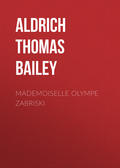
Aldrich Thomas Bailey
The Stillwater Tragedy
XV
"Since we are in for it," said Mr. Slocum the next morning, "put the case to them squarely."
Mr. Slocum's vertebræ had stiffened over night.
"Leave that to me, sir," Richard replied. "I have been shaping out in my mind a little speech which I flatter myself will cover the points. They have brought this thing upon themselves, and we are about to have the clearest of understandings. I never saw the men quieter."
"I don't altogether admire that. It looks as if they hadn't any doubt as to the issue."
"The clearest-headed have no doubt; they know as well as you and I do the flimsiness of those resolutions. But the thick heads are in a fog. Every man naturally likes his pay increased; if a simple fellow is told five or six hundred times that his wages ought to be raised, the idea is so agreeable and insidious that by and by he begins to believe himself grossly underpaid, though he may be getting twice what he is worth. He doesn't reason about it; that's the last thing he'll do for you. In this mood he lets himself be flown away by the breath of some loud-mouthed demagogue, who has no interest in the matter beyond hearing his own talk and passing round the hat after the meeting is over. That is what has happened to our folks below. But they are behaving handsomely."
"Yes, and I don't like it."
Since seven o'clock the most unimpeachable decorum had reigned in the workshops. It was now nine, and this brief dialogue had occurred between Mr. Slocum and Richard on the veranda, just as the latter was on the point of descending into the yard to have his talk with the men.
The workshops–or rather the shed in which the workshops were, for it was one low structure eighteen or twenty feet wide and open on the west side–ran the length of the yard, and with the short extension at the southerly end formed the letter L. There were no partitions, an imaginary line separating the different gangs of workers. A person standing at the head of the building could make himself heard more or less distinctly in the remotest part.
The grating lisp of the wet saws eating their way into the marble boulder, and the irregular quick taps of the seventy or eighty mallets were not suspended as Richard took his stand beside a tall funereal urn at the head of the principal workshop. After a second's faltering he rapped smartly on the lip of the urn with the key of his studio-door.
Instantly every arm appeared paralyzed, and the men stood motionless, with the tools in their hands.
Richard began in a clear but not loud voice, though it seemed to ring on the sudden silence:–
"Mr. Slocum has asked me to say a few words to you, this morning, about those resolutions, and one or two other matters that have occurred to him in this connection. I am no speech-maker; I never learned that trade"–
"Never learned any trade," muttered Durgin, inaudibly.
–-"but I think I can manage some plain, honest talk, for straight-forward men."
Richard's exordium was listened to with painful attention.
"In the first place," he continued, "I want to remind you, especially the newer men, that Slocum's Yard has always given steady work and prompt pay to Stillwater hands. No hand has ever been turned off without sufficient cause, or kept on through mere favoritism. Favors have been shown, but they have been shown to all alike. If anything has gone crooked, it has been straightened out as soon as Mr. Slocum knew of it. That has been the course of the yard in the past, and the Proprietor doesn't want you to run away with the idea that that course is going to be changed. One change, for the time being, is going to be made at our own suggestion. From now, until the 1st of September, this yard will close gates on Saturdays at five P.M. instead of six P.M."
Several voices cried, "Good for Slocum!" "Where's Slocum?" "Why don't Slocum speak for himself?" cried one voice.
"It is Mr. Slocum's habit," answered Richard, "to give his directions to me, I give them to the foremen, and the foremen to the shops. Mr. Slocum follows that custom on this occasion. With regard to the new scale of wages which the Association has submitted to him, the Proprietor refuses to accept it, or any modification of it."
A low murmur ran through the workshops.
"What's a modificashun, sir?" asked Jemmy Willson, stepping forward, and scratching his left ear diffidently.
"A modification," replied Richard, considerably embarrassed to give an instant definition, "is a–a"–
"A splitting of the difference, by–!" shouted somebody in the third shop.
"Thank you," said Richard, glancing in the direction of his impromptu Webster's Unabridged. "Mr. Slocum does not propose to split the difference. The wages in every department are to be just what they are,–neither more nor less. If anybody wishes to make a remark," he added, observing a restlessness in several of the men, "I beg he will hold on until I get through. I shall not detain you much longer, as the parson says before he has reached the middle of his sermon.
"What I say now, I was charged to make particularly clear to you. It is this: In future Mr. Slocum intends to run Slocum's Yard himself. Neither you, nor I, nor the Association will be allowed to run it for him. [Sensation.] Until now the Association has tied him down to two apprentices a year. From this hour, out, Mr. Slocum will take on, not two, or twenty, but two hundred apprentices if the business warrants it."
The words were not clearly off Richard's lips when the foreman of the shop in which he was speaking picked up a couple of small drills, and knocked them together with a sharp click. In an instant the men laid aside their aprons, bundled up their tools, and marched out of the shed two by two, in dead silence. That same click was repeated almost simultaneously in the second shop, and the same evolution took place. Then click, click, click! went the drills, sounding fainter and fainter in the distant departments; and in less than three minutes there was not a soul left in Slocum's Yard except the Orator of the Day.
Richard had anticipated some demonstration, either noisy or violent, perhaps both; but this solemn, orderly desertion dashed him.
He stepped into the middle of the yard, and glancing up beheld Margaret and Mr. Slocum standing on the veranda. Even at that distance he could perceive the pallor on one face, and the consternation written all over the other.
Hanging his head with sadness, Richard crossed the yard, which gave out mournful echoes to his footfalls, and swung to the large gate, nearly catching old Giles by the heel as he did so. Looking through the slats, he saw Lumley and Peterson hobbling arm in arm down the street,–after more than twenty-five years of kindly treatment.
"Move number one," said Richard, lifting the heavy cross-piece into its place and fastening it with a wooden pin. "Now I must go and prop up Mr. Slocum."
XVI
There is no solitude which comes so near being tangible as that of a vast empty workshop, crowded a moment since. The busy, intense life that has gone from it mysteriously leaves behind enough of itself to make the stillness poignant. One might imagine the invisible ghost of doomed Toil wandering from bench to bench, and noiselessly fingering the dropped tools, still warm from the workman's palm. Perhaps this impalpable presence is the artisan's anxious thought, stolen back to brood over the uncompleted task.
Though Mr. Slocum had spoken lightly of Slocum's Yard with only one workman in it, when he came to contemplate the actual fact he was struck by the pathos of it, and the resolution with which he awoke that morning began to desert him.
"The worst is over," exclaimed Richard, joining his two friends on the veranda, "and everything went smoother than I expected."
"Everything went, sure enough," said Mr. Slocum, gloomily; "they all went,–old Giles, and Lumley, and everybody."
"We somewhat expected that, you know."
"Yes, I expected it, and wasn't prepared for it."
"It was very bad," said Richard, shaking his head.
The desertion of Giles and his superannuated mates especially touched Mr. Slocum.
"Bad is no word; it was damnable."
"Oh, papa!"
"Pardon me, dear; I couldn't help it. When a man's pensioners throw him over, he must be pretty far gone!"
"The undertow was too strong for them, sir, and they were swept away with the rest. And they all but promised to stay. They will be the very first to come back."
"Of course we shall have to take the old fellows on again," said Mr. Slocum, relenting characteristically.
"Never!" cried Richard.
"I wish I had some of your grit."
"I have none to spare. To tell the truth, when I stood up there to speak, with every eye working on me, like a half-inch drill, I would have sold myself at a low figure."
"But you were a perfect what's-his-name,–Demosthenes," said Mr. Slocum, with a faint smile. "We could hear you."
"I don't believe Demosthenes ever moved an audience as I did mine!" cried Richard gaily. "If his orations produced a like effect, I am certain that the Grecian lecture-bureau never sent him twice to the same place."
"I don't think, Richard, I would engage you over again."
"I am sure Richard spoke very well," interrupted Margaret. "His speech was short"–
"Say shortened, Margaret, for I hadn't got through when they left."
"No, I will not jest about it. It is too serious for jesting. What is to become of the families of all these men suddenly thrown out of employment?"
"They threw themselves out, Mag," said her father.
"That does not mend the matter, papa. There will be great destitution and suffering in the village with every mill closed; and they are all going to close, Bridget says. Thank Heaven that this did not happen in the winter!"
"They always pick their weather," observed Mr. Slocum.
"It will not be for long," said Richard encouragingly. "Our own hands and the spinners, who had no ground for complaint, will return to work shortly, and the managers of the iron mills will have to yield a point or two. In a week at the outside everything will be running smoothly, and on a sounder foundation than before. I believe the strike will be an actual benefit to everybody in the end."
By dint of such arguments and his own sanguine temperament, Richard succeeded in reassuring Mr. Slocum for the time being, though Richard did not hide from himself the gravity of the situation. There was a general strike in the village. Eight hundred men were without work. That meant, or would mean in a few days, two or three thousand women and children without bread. It does not take the wolf long to reach a poor man's door when it is left ajar.
The trades-union had a fund for emergencies of this sort, and some outside aid might be looked for; but such supplies are in their nature precarious and soon exhausted. It is a noticeable feature of strikes that the moment the workman's pay stops his living expenses increase. Even the more economical becomes improvident. If he has money, the tobacco shop and the tavern are likely to get more of it than the butcher's cart. The prolonged strain is too great to be endured without stimulant.
XVII
During the first and second days of the strike, Stillwater presented an animated and even a festive appearance. Throngs of operatives in their Sunday clothes strolled through the streets, or lounged at the corners chatting with other groups; some wandered into the suburbs, and lay in the long grass under the elms. Others again, though these were few, took to the turnpike or the railroad track, and tramped across country.
It is needless to say that the bar-room of the tavern was crowded from early morning down to the hour when the law compelled Mr. Snelling to shut off his gas. After which, John Brown's "soul" could be heard "marching on" in the darkness, through various crooked lanes and alleys, until nearly daybreak.
Among the earliest to scent trouble in the air was Han-Lin, the Chinaman before mentioned. He kept a small laundry in Mud Lane, where his name was painted perpendicularly on a light of glass in the basement window of a tenement house. Han-Lin intended to be buried some day in a sky-blue coffin in his own land, and have a dozen packs of firecrackers decorously exploded over his remains. In order to reserve himself for this and other ceremonies involving the burning of a great quantity of gilt paper, he quietly departed for Boston at the first sign of popular discontent. As Dexter described it, "Han-Lin coiled up his pig-tail, put forty grains of rice in a yallar bag,–enough to last him a month!–and toddled off in his two-story wooden shoes." He could scarcely have done a wiser thing, for poor Han-Lin's laundry was turned wrong side out within thirty-six hours afterwards.
The strike was popular. The spirit of it spread, as fire and fever and all elemental forces spread. The two apprentices in Brackett's bakery had a dozen minds about striking that first morning. The younger lad, Joe Wiggin, plucked up courage to ask Brackett for a day off, and was lucky enough to dodge a piece of dough weighing nearly four pounds.
Brackett was making bread while the sun shone. He knew that before the week was over there would be no cash customers, and he purposed then to shut up shop.
On the third and fourth days there was no perceptible fall in the barometer. Trade was brisk with Snelling, and a brass band was playing national airs on a staging erected on the green in front of the post-office. Nightly meetings took place at Grimsey's Hall, and the audiences were good-humored and orderly. Torrini advanced some Utopian theories touching a universal distribution of wealth, which were listened to attentively, but failed to produce deep impression.
"That's a healthy idea of Torrini's about dervidin' up property," said Jemmy Willson. "I've heerd it afore; but it's sing'ler I never knowd a feller with any property to have that idea."
"Ther' 's a great dale in it, I can tell ye," replied Michael Hennessey, with a well-blackened Woodstock pipe between his teeth and his hands tucked under his coat-tails. "Isn't ther', Misther Stavens?"
When Michael had on his bottle-green swallow-tailed coat with the brass buttons, he invariably assumed a certain lofty air of ceremony in addressing his companions.
"It is sorter pleasant to look at," returned Stevens, "but it don't seem to me an idea that would work. Suppose that, after all the property was divided, a fresh shipload of your friends was to land at New York or Boston; would there be a new deal?"
"No, sir! by no means!" exclaimed Michael excitedly. "The furreners is counted out!"
"But you're a foreigner yourself, Mike."
"Am I, then? Bedad, I'm not! I'm a rale American Know Nothing."
"Well, Mike," said Stevens maliciously, "when it comes to a reg'lar division of lands and greenbacks in the United States, I go in for the Chinese having their share."
"The Chinese!" shouted Michael. "Oh, murther, Misther Stevens! Ye wouldn't be fur dividin' with thim blatherskites!"
"Yes, with them,–as well as the rest," returned Stevens, dryly.
Meanwhile the directors and stockholders of the various mills took counsel in a room at the rear of the National Bank. Mr. Slocum, following Richard's advice, declined to attend the meeting in person, or to allow his name to figure on the list of vice-presidents.
"Why should we hitch our good cause to their doubtful one?" reflected Richard. "We have no concessions or proposals to make. When our men are ready to come back to us, they will receive just wages and fair treatment. They know that. We do not want to fight the molders. Let the iron-mills do their own fighting;" and Richard stolidly employed himself in taking an account of stock, and forwarding by express to their destination the ten or twelve carved mantel-pieces that happily completed the last contract.
Then his responsibilities shrunk to winding up the office clock and keeping Mr. Slocum firmly on his legs. The latter was by far the more onerous duty, for Mr. Slocum ran down two or three times in the course of every twenty-four hours, while the clock once wound was fixed for the day.
"If I could only have a good set of Waltham works put into your father," said Richard to Margaret, after one of Mr. Slocum's relapses, "he would go better."
"Poor papa! he is not a fighter, like you."
"Your father is what I call a belligerent non-combatant."
Richard was seeing a great deal of Margaret these days. Mr. Slocum had invited him to sleep in the studio until the excitement was past. Margaret was afraid to have him take that long walk between the yard and his lodgings in Lime Street, and then her father was an old man to be without any protection in the house in such untoward times.
So Richard slept in the studio, and had his plate at table, like one of the family. This arrangement was favorable to many a stolen five minutes with Margaret, in the hall or on the staircase. In these fortuitous moments he breathed an atmosphere that sustained him in his task of dispelling Mr. Slocum's recurrent fits of despondency. Margaret had her duties, too, at this period, and the forenoons were sacred to them.
One morning as she passed down the street with a small wicker basket on her arm, Richard said to Mr. Slocum,–
"Margaret has joined the strikers."
The time had already come to Stillwater when many a sharp-faced little urchin–as dear to the warm, deep bosom that had nursed it as though it were a crown prince–would not have had a crust to gnaw if Margaret Slocum had not joined the strikers. Sometimes her heart drooped on the way home from these errands, upon seeing how little of the misery she could ward off. On her rounds there was one cottage in a squalid lane where the children asked for bread in Italian. She never omitted to halt at that door.
"Is it quite prudent for Margaret to be going about so?" queried Mr. Slocum.
"She is perfectly safe," said Richard,–"as safe as a Sister of Charity, which she is."
Indeed, Margaret might then have gone loaded with diamonds through the streets at midnight. There was not a rough man in Stillwater who would not have reached forth an arm to shield her.
"It is costing me nearly as much as it would to carry on the yard," said Mr. Slocum, "but I never put out any stamps more willingly."
"You never took a better contract, sir, than when you agreed to keep Margaret's basket filled. It is an investment in real estate–hereafter."
"I hope so," answered Mr. Slocum, "and I know it's a good thing now."
Of the morals of Stillwater at this time, or at any time, the less said the better. But out of the slime and ooze below sprang the white flower of charity.
The fifth day fell on a Sabbath, and the churches were crowded. The Rev. Arthur Langly selected his text from St. Matthew, chap. xxii, v. 21: "Render therefore unto Cæsar the things which are Cæsar's." But as he did not make it quite plain which was Cæsar,–the trades-union or the Miantowona Iron Works,–the sermon went for nothing, unless it could be regarded as a hint to those persons who had stolen a large piece of belting from the Dana Mills. On the other hand, Father O'Meara that morning bravely told his children to conduct themselves in an orderly manner while they were out of work, or they would catch it in this world and in the next.
On the sixth day a keen observer might have detected a change in the atmosphere. The streets were thronged as usual, and the idlers still wore their Sunday clothes, but the holiday buoyancy of the earlier part of the week had evaporated. A turn-out on the part of one of the trades, though it was accompanied by music and a banner with a lively inscription, failed to arouse general enthusiasm. A serious and even a sullen face was not rare among the crowds that wandered aimlessly up and down the village.
On the seventh day it required no penetration to see the change. There was decidedly less good-natured chaffing and more drunkenness, though Snelling had invoked popular contumely and decimated his bar-room by refusing to trust for drinks. Bracket had let his ovens cool, and his shutters were up. The treasury of the trades-union was nearly drained, and there were growlings that too much had been fooled away on banners and a brass band for the iron men's parade the previous forenoon. It was when Brackett's eye sighted the banner with "Bread or Blood" on it, that he had put up his shutters.
Torrini was now making violent harangues at Grimsey's Hall to largely augmented listeners, whom his words irritated without convincing. Shut off from the tavern, the men flocked to hear him and the other speakers, for born orators were just then as thick as unripe whortleberries. There was nowhere else to go. At home were reproaches that maddened, and darkness, for the kerosene had given out.
Though all the trades had been swept into the movement, it is not to be understood that every workman was losing his head. There were men who owned their cottages and had small sums laid by in the savings-bank; who had always sent their children to the district school, and listened themselves to at least one of Mr. Langly's sermons or one of Father O'Meara's discourses every Sunday. These were anchored to good order; they neither frequented the bar-room nor attended the conclaves at Grimsey's Hall, but deplored as deeply as any one the spirit that was manifesting itself. They would have returned to work now–if they had dared. To this class belonged Stevens.
"Why don't you come up to the hall, nights?" asked Durgin, accosting him on the street, one afternoon. "You'd run a chance of hearing me hold forth some of these evenings."
"You've answered your own question, William. I shouldn't like to see you making an idiot of yourself."
"This is a square fight between labor and capital," returned Durgin with dignity, "and every man ought to take a hand in it."
"William," said Stevens meditatively, "do you know about the Siamese twins?"
"What about 'em,–they're dead, ain't they?" replied Durgin, with surprise.
"I believe so; but when they was alive, if you was to pinch one of those fellows, the other fellow would sing out. If you was to black the eye of the left-hand chap, the right-hand chap wouldn't have been able to see for a week. When either of 'em fetched the other a clip, he knocked himself down. Labor and capital is jined just as those two was. When you've got this fact well into your skull, William, I shall be pleased to listen to your ideas at Grimsey's Hall or anywhere else."
Such conservatism as Stevens's, however, was necessarily swept out of sight for the moment. The wealthier citizens were in a state bordering on panic,–all but Mr. Lemuel Shackford. In his flapping linen duster, for the weather was very sultry now, Mr. Shackford was seen darting excitedly from street to street and hovering about the feverish crowds, like the stormy petrel wheeling on the edges of a gale. Usually as chary of his sympathies as of his gold, he astonished every one by evincing an abnormal interest in the strikers. The old man declined to put down anything on the subscription paper then circulating; but he put down his sympathies to any amount. He held no stock in the concerns involved; he hated Slocum, and he hated the directors of the Miantowona Iron Works. The least he hoped was that Rowland Slocum would be laid out.
So far the strikers had committed no overt act of note, unless it was the demolition of Han-Lin's laundry. Stubbs, the provision dealer, had been taught the rashness of exposing samples of potatoes in his door-way, and the "Tonsorial Emporium" of Professor Brown, a colored citizen, had been invaded by two humorists, who, after having their hair curled, refused to pay for it, and the professor had been too agitated to insist. The story transpiring, ten or twelve of the boys had dropped in during the morning, and got shaved on the same terms. "By golly, gen'l'men!" expostulated the professor, "ef dis yah thing goes on, dis darkey will be cleaned cl'ar out fo de week's done." No act of real violence had been perpetrated as yet; but with bands of lawless men roaming over the village at all hours of the day and night, the situation was critical.
The wheel of what small social life there was in Stillwater had ceased to revolve. With the single exception of Lemuel Shackford, the more respectable inhabitants kept in-doors as much as practicable. From the first neither Mr. Craggie nor Lawyer Perkins had gone to the hotel to consult the papers in the reading-room, and Mr. Pinkham did not dare to play on his flute of an evening. The Rev. Arthur Langly found it politic to do but little visiting in the parish. His was not the pinion to buffet with a wind like this, and indeed he was not explicitly called upon to do so. He sat sorrowfully in his study day by day, preparing the weekly sermon,–a gentle, pensive person, inclined in the best of weather to melancholia. If Mr. Langly had gone into arboriculture instead of into the ministry, he would have planted nothing but weeping-willows.
In the mean time the mill directors continued their deliberations in the bank building, and had made several abortive attempts to effect an arrangement with the leaders of the union. This seemed every hour less possible and more necessary.
On the afternoon of the seventh day of the strike a crowd gathered in front of the residence of Mr. Alexander, the superintendent of the Miantowona Iron Works, and began groaning and hooting. Mr. Alexander sought out Mr. Craggie, and urged him, as a man of local weight and one accustomed to addressing the populace, to speak a few words to the mob. That was setting Mr. Craggie on the horns of a cruel dilemma. He was afraid to disoblige the representative of so powerful a corporation as the Miantowona Iron Works, but he equally dreaded to risk his popularity with seven or eight hundred voters; so, like the crafty chancellor in Tennyson's poem, he dallied with his golden chain, and, smiling, but the question by.
"Drat the man!" muttered Mr. Craggie, "does he want to blast my whole political career! I can't pitch into our adopted countrymen."
There was a blot on the escutcheon of Mr. Craggie which he was very anxious not to have uncovered by any chance in these latter days,–his ancient affiliation with the deceased native American party.
The mob dispersed without doing damage, but the fact that it had collected and had shown an ugly temper sent a thrill of apprehension through the village. Mr. Slocum came in a great flurry to Richard.
"This thing ought to be stopped," said Mr. Slocum.
"I agree to that," replied Richard, bracing himself not to agree to anything else.
"If we were to drop that stipulation as to the increase of apprentices, no doubt many of the men would give over insisting on an advance."
"Our only salvation is to stick to our right to train as many workmen as we choose. The question of wages is of no account compared with that; the rate of wages will adjust itself."
"If we could manage it somehow with the marble workers," suggested Mr. Slocum, "that would demoralize the other trades, and they'd be obliged to fall in."
"I don't see that they lack demoralization."
"If something isn't done, they'll end up by knocking in our front doors or burning us all up."
"Let them."
"It's very well to say let them," exclaimed Mr. Slocum, petulantly, "when you haven't any front door to be knocked in!"
"But I have you and Margaret to consider, if there were actual danger. When anything like violence threatens, there's an honest shoulder for every one of the hundred and fifty muskets in the armory."
"Those muskets might get on the wrong shoulders."
"That isn't likely. You do not seem to know, sir, that there is a strong guard at the armory day and night."
"I was not aware of that."
"It is a fact all the same," said Richard; and Mr. Slocum went away easier in his mind, and remained so–two or three hours.
On the eighth, ninth, and tenth days the clouds lay very black along the horizon. The marble workers, who began to see their mistake, were reproaching the foundry men with enticing them into to coalition, and the spinners were hot in their denunciations of the molders. Ancient personal antagonisms that had been slumbering started to their feet. Torrini fell out of favor, and in the midst of one of his finest perorations uncomplimentary missiles, selected from the animal kingdom, had been thrown at him. The grand torchlight procession on the night of the ninth culminated in a disturbance, in which many men got injured, several badly, and the windows of Brackett's bakery were stove in. A point of light had pierced the darkness,–the trades were quarreling among themselves!
The selectmen had sworn in special constables among the citizens, and some of the more retired streets were now patrolled after dark, for there had been threats of incendiarism.
Bishop's stables burst into flames one midnight,–whether fired intentionally or accidentally was not known; but the giant bellows at Dana's Mills was slit and two belts were cut at the Miantowona Iron Works that same night.
At this juncture a report that out-of-town hands were coming to replace the strikers acted on the public mind like petroleum on fire. A large body of workmen assembled near the railway station,–to welcome them. There was another rumor which caused the marble workers to stare at each other aghast. It was to the effect that Mr. Slocum, having long meditated retiring from business, had now decided to do so, and was consulting with Wyndham, the keeper of the green-house, about removing the division wall and turning the marble yard into a peach garden. This was an unlooked-for solution of the difficulty. Stillwater without any Slocum's Marble Yard was chaos come again.
"Good Lord, boys!" cried Piggott, "if Slocum should do that!"
Meanwhile, Snelling's bar had been suppressed by the authorities, and a posse of policemen, borrowed from South Millville, occupied the premises. Knots of beetle-browed men, no longer in holiday gear, but chiefly in their shirt-sleeves, collected from time to time at the head of the main street, and glowered threateningly at the single policeman pacing the porch of the tavern. The Stillwater Grays were under arms in the armory over Dundon's drugstore. The thoroughfare had ceased to be safe for any one, and Margaret's merciful errands were necessarily brought to an end. How the poor creatures who had depended on her bounty now continued to exist was a sorrowful problem.







